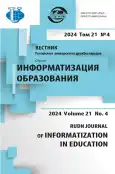The feasibility and methods of developing the foreign language teachers’ competence in the field of using digital technologies in professional activities
- Authors: Grinshkun V.V.1, Kopylova V.V.2
-
Affiliations:
- RUDN University
- Prosveschenie Publishers
- Issue: Vol 21, No 4 (2024)
- Pages: 419-433
- Section: ICT SKILLS AND COMPETENCIES AMONG TEACHERS
- URL: https://journal-vniispk.ru/2312-8631/article/view/321355
- DOI: https://doi.org/10.22363/2312-8631-2024-21-4-419-433
- EDN: https://elibrary.ru/SEYVSV
- ID: 321355
Cite item
Full Text
Abstract
Problem statement. Every year, there are more and more studies aimed at improving the quality of digital resources created and used in the field of education, as well as at developing appropriate professional qualities among teachers. Within the framework of foreign language education, when using various digital tools, vocabulary is formed more effectively, dialogues are modeled, oral speech is used to a greater extent, and opportunities for mastering grammar are expanded. At the same time, existing research practically does not address the problem of finding integrated approaches to preparing teachers for the practical use of digital resources in the framework of the development of foreign language education. The problem of substantiating the expediency of improving the necessary systems for training teachers of a foreign language, searching for methods and means to improve the effectiveness of work with students of pedagogical specialties of universities is urgent. Methodology. A long-term study is being carried out, during which educational programs for bachelors and masters of pedagogical directions of metropolitan universities are being developed and improved. A series of experimental studies are being conducted to determine the effectiveness of the proposed developments. Results. The model, conditions, principles and content of training future foreign language teachers for the professional use of digital technologies are developed and described. An increase in several key parameters for the study was revealed, indicating the validity and effectiveness of the proposed approaches to the development of the studied competence of foreign language teachers. Conclusion. The implementation of approaches to the development of the competence of a foreign language teacher in the field of using digital technologies is appropriate. It is necessary to provide for the further development of methodological systems for teaching students at pedagogical universities the systematic use of such technologies not only in the context of teaching schoolchildren, but also in many other types of their professional activities.
About the authors
Vadim V. Grinshkun
RUDN University
Author for correspondence.
Email: vadim@grinshkun.ru
ORCID iD: 0000-0002-8204-9179
Doctor of Pedagogical Sciences, Professor, Academician of the Russian Academy of Education, Professor at the Department of Information Technologies in Continuing Education
6 Miklukho-Maklaya St, Moscow, 117198, Russian FederationVictoria V. Kopylova
Prosveschenie Publishers
Email: vkopylova@list.ru
ORCID iD: 0009-0009-7562-2289
Candidate of Pedagogical Sciences, Associate Professor, VicePresident
16/3 Krasnoproletarskaya St, Moscow, 127473, Russian FederationReferences
- Filippov VM, Krasnova GA, Grinshkun VV. Cross-border education. Paid Education. 2008;6:36–38. (In Russ.)
- Grigoriev SG, Grinshkun VV. On the development of the textbook “Informatization of Education”. Vestnik of Moscow City University. Series: Informatics and Informatization of Education. 2005;4:24–28. (In Russ.)
- Dronov VP, Kopylova VV. Educational and methodological support today – the transition to new forms. In: Theory and practice of teaching foreign languages: traditions and innovations: Proceedings of the International Scientific and Practical Conference in Memory of Academician of the Russian Academy of Education Inessa Lvovna Bim, 2–3 April 2013, Moscow. Moscow: Tezaurus Publ.; 2013. p. 211–213. (In Russ.)
- Grigoriev SG, Grinshkun VV, Zaslavskaya OYu, Kopylova VV. Teaching humanitarian disciplines in the context of informatization of basic and high school: a teaching aid for students of the professional retraining system. Moscow: Education and Informatics; 2018. (In Russ.)
- Marchenko VN, Kretova LN. Using the resources of an electronic English textbook in the general education space. Humanitarian Studies. Pedagogy and Psychology. 2021;8:51–58. (In Russ.)
- Pak AE. The use of computer technology in teaching English. Linguistica Juvenis. 2018;20:169–180. (In Russ.)
- Savina AA, Kolarkova OG. Experience of using electronic educational resources in teaching foreign languages. Problems of Modern Pedagogical Education. 2020;66-3: 254–257. (In Russ.)
- Semenova YuI. Basics of developing electronic educational resources in teaching foreign languages. Scientific Notes. Electronic Scientific Journal of Kursk State University. 2020;1(53):157–166. (In Russ.)
- Silkova YuS. Teaching a foreign language based on electronic educational resources. In: Innovative activities in modernization of the agro-industrial complex: Proceedings of the International Scientific and Practical Conference of Students, Graduate Students and Young Scientists, 7–9 December 2016, Kursk. Part 3. Kursk: Kursk State Agricultural Academy; 2017. p. 337–340. (In Russ.)
- Taran DA. Using electronic educational resources in teaching English. Trends, factors and mechanisms for increasing effectiveness of domestic science: Proceedings of the AllRussian Scientific and Practical Conference with International Participation, 13 June 2023, Omsk. Ufa: Aeterna; 2023. p. 106–108. (In Russ.)
- Khlybova MA. Use of electronic educational resources in the process of teaching foreign languages. Open and Distance Education. 2021;2(80):52–56. (In Russ.)
- Fidarova KK, Pavlova GSh, Varlamova EV, Beginina AO. Electronic technologies in teaching a foreign language. Modern Problems of Science and Education. 2020;6. (In Russ.) https://doi.org/10.17513/spno.30439
- Ganchimeg T, Sunjidmaa Kh. Technical development and internet sources in foreign language teaching. In: Russian language in modern China: Proceedings of the X International Scientific and Practical Conference, 21 April 2023, Chita. Chita: Transbaikal State University; 2023. p. 104–107.
- Israilova MN, Yuldasheva DYu. Use of modern methods in teaching foreign languages. Theoretical & Applied Science. 2021;11(103):901–903.
- Vikulova L, Yazykova N, Makarova I, Gerasimova S. New technologies in teaching foreign languages: expertise in network interactions. In: Education and educational psychology: Proceedings of the 5th International Forum on Teacher Education, 29–31 May 2019, Kazan. Kazan: European Publisher; 2020. p. 260–268.
- Martyushev N, Shutaleva A, Malushko E, Nikonova Zh, Savchenko I. Online communication tools in teaching foreign languages for education sustainability. Sustainability. 2021;13(19). https://doi.org/10.3390/su131911127
- Kopylova VV. Media text in foreign-language lingvodidactic communication. Media Linguistics Journal. 2017;6: 227–228. (Proceedings of the II International Scientific and Practical Conference “Language in the coordinates of mass media”). (In Russ.)
Supplementary files









